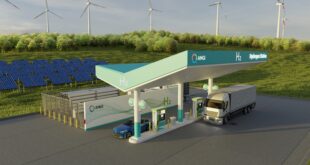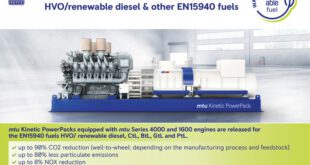We try to present a balanced view of the emerging alternative energy technologies on our pages. That means taking a critical eye to the science and tech of what is behind those options. I found a good article today that talks about [tag]hydrogen fuel cell[/tag] technology and why the writer does not think it has viability in the near term.
Ed Ring of www.ecoworld.com argues in an Always On post titled “The Hydrogen Hoax” that hydrogen production uses too much energy going in for the resulting output, whether you are using biomass, electricity or god forbid fossil fuels to generate the hyrdogen in the first place.
First of all, hydrogen isn’t a primary fuel. It has to be produced from something else, either from electricity via electrolysis, or refined from fossil fuel, or distilled from biomass. In all these cases, using the source fuel directly would be far more efficient than converting this energy into hydrogen.
There are many proponents of this technology in the mainstream these days but do they have their information down. In California the Govenor has proposed a whole network of hydrogen service stations across the state, well he did awhile ago anyways but not much has been heard from him on that front lately. Maybe reality crept into the equation.
I think there is room for optimism in this are of fuel technology but perhaps it is not our savior in the near term as many environmentalists have proposed.
What do you think?
 Alternative Energy HQ solar power for homes, wind energy, and bio fuel issues
Alternative Energy HQ solar power for homes, wind energy, and bio fuel issues









To me, the Ed Ring article sounds like T.J. Watson’s possibly apocryphal remark in the 1940s that there might be a world market for maybe five computers. Another brilliant man, Cambridge mathematician Professor Douglas Hartree—who built the first differential analyzers and who was an early programming guru—supposedly said this around 1951:
… all the calculations that would ever be needed in this country could be done on the three digital computers which were then being built — one in Cambridge, one in Teddington, and one in Manchester. No one else, he said, would ever need machines of their own, or would be able to afford to buy them.
(quotation from an article by Lord Bowden; American Scientist vol 58 (1970) pp 43–53); cited on Usenet and the Wikipedia entry under “T.J. Watson.”)
The point is, ALMOST EVERYONE—even many of the most brilliant among us—always goes off to fight the last war, and new technology is always conceived of as being almost the same as the existing technology, only not as good. People don’t usually anticipate that new technology could ultimately have many benefits that they can’t even imagine, or that adoption could come for different reasons on in different contexts that make all the current technologies seem silly and quaint.
So, for example, the Ring article presumes that we DON’T use clean, non-fossil fuel sources of energy to produce power in the first place, because we don’t today. The answer is that we simply have to invest in some of those clean sources of energy to make it work. You could make the same argument about the electric car; if you buy the power to charge the car from companies that are heavily into coal burning, then Ring is right, and you’ve just transferred the pollution from the city to the country. This merely underscores the need to ALSO develop cleaner, more sustainable sources of power.
The Ring article also presumes that there is only one way of producing hydrogen, when there are myriads. For example, there is the hydrogen-on-demand Hydratus system that Ecotality (www.ecotality.com) co-created with JPL, and there are many other systems that either compete with Ecotality or are aimed at different segments. (Ecotality is aiming for the big commercial fleets, which already bring their vehicles back to central locations for fueling, so they can ride out the chicken-and-the-egg fueling-station problem that plagues the consumer marketplace.)
But once you’ve done something that people really want and need done, the imagination, money and talent usually end up rushing off in that direction. In this case, we DESPERATELY need to confront that fact that our current technologies, based on fossil fuels, are going to go away eventually (the only question is how fast), and in addition are poisoning us. People really WANT an alternative that fits in with their lives and will solve the problem of having to suck up to Saudi Arabia every time they fill up, not to mention jeopardizing the futures of the very children that they transport in their minivans and SUVs. Hydrogen-on-demand, biodiesel, and several other technologies meet these objectives. They ARE the way of the future, despite existing problems that are being worked out every day by today’s smartest people.